AI-based technologies are increasingly revolutionizing how we manage, maintain, and capture IP—and there is more to come. We explore four key areas where Generative AI is already making a major difference for patent professionals and explain how responsible use of AI could enhance efficiency, productivity, and risk reduction across the IP lifecycle in the next 5-10 years.
Imagine a future where an inventor can research, develop, and launch the workflow for an invention in a company's IP management system (IPMS) with a simple voice command. This was the scenario put forward by our expert speakers in our recent webinar on Generative AI and IP, and the good news is this future is closer than you may think.
In the next 10 years, we could become so used to working with AI-based tools that many of the processes that IP professionals currently manage manually will be automated and supported (or "copiloted") by AI and IP assistants.

As a result of advances in AI algorithms, inventors would not only enter their inventions into an IPMS remotely with ease, but that IPMS would then launch an automated workflow that timestamps the invention on the blockchain, generates a "smart" contract for the inventor, and officially assigns the case to a patent engineer accompanied by a comprehensive prior art search report.
Thanks to Generative AI (or Gen AI), that IPMS would then generate a first draft of a patent application or proofread/cross-check the patent engineer's own draft. Once validated, the IPMS could even pick up where it left off: filing the patent according to a pre-defined prosecution strategy in all jurisdictions of interest, predicting its likelihood of grant, enabling discussions with examiners over patentability, and generating pre-agreed payments to the inventor at each of these stages.
These are just some of the scenarios that Questel's experts predict will influence the evolution of patent management technology in the coming years. And the future is already closer than we think, with many of these AI-based technologies and capabilities already in development or use.
AI and IP: From Automated Workflows to Portfolio Copilots
While AI has risen in prominence this year, the technology itself is not new to the IP sector. As we featured in our eBook 'How AI is Transforming IP Management for Good,' AI technologies are already well-established in our profession, due to their ability to automate, streamline, and harness the data from many time-consuming IP portfolio management tasks.
What is different today is the rise of Gen AI IP tools that can further leverage these capabilities and provide a tipping point for improved efficiency, increased productivity, and reduced risk.
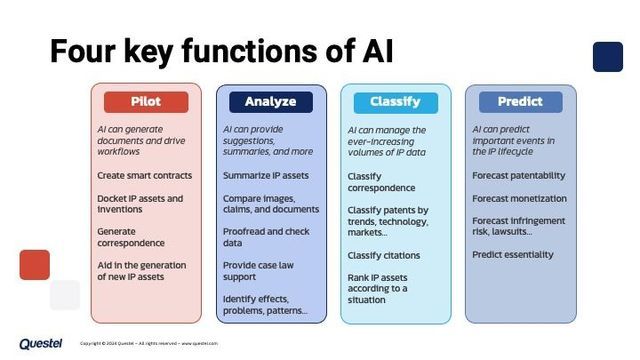
AI has significant potential to support the most repetitive, highly structured, and burdensome processes that do not require significant human interactions.
Alongside continued evolution in algorithm-based AI tools, we expect Gen AI to support IP professionals in solving highly complex and data-intensive problems by generating summaries, analyzing suggestions, classifying correspondence, validating data, and ranking citations, as well as driving workflows and creating or proofreading drafts.
Here are four key areas where AI is already making a major difference for patent professionals:
- AI and IP Hot Topics: Patent Prosecution Workflow Automation
The ability to streamline and automate highly complex, yet routine tasks is vital to building efficiency. However, if IP professionals are forced to rely on data or processes from multiple sources or systems, they are unlikely to trust fully in the ability of an AI and IP tool to deliver the necessary input and generate the required suggestions, processes, and deadlines.
Digital workspaces, such as Questel's patent prosecution workflow automation tool, overcome that challenge by enabling IP professionals to manage and oversee the entire workflow via a single, persistent interface. It collects all relevant data and documents in one centralized, collaborative, and secure digital workspace, employing AI copilots to automate analysis, answer common queries, and prepare correspondence.
- AI and IP Hot Topics: Patent Drafting
When we asked our IP Industry Outlook research participants to share where they would most like to use Gen AI tools for patents, 32% put patent drafting at the top of their AI and IP wish lists:
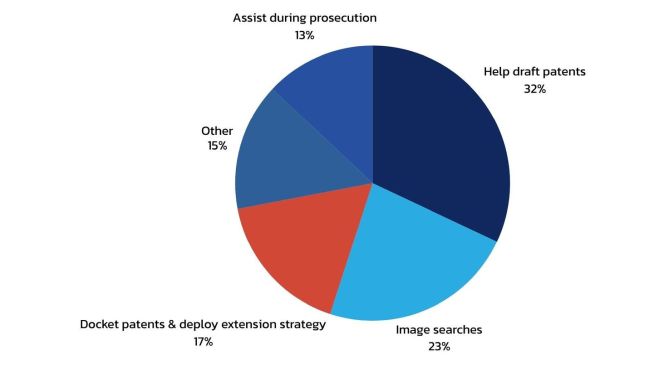
Accordingly, our webinar included a short demo of our AI-based patent search tool, including profiling its ability to generate and edit patent drafts securely on demand.
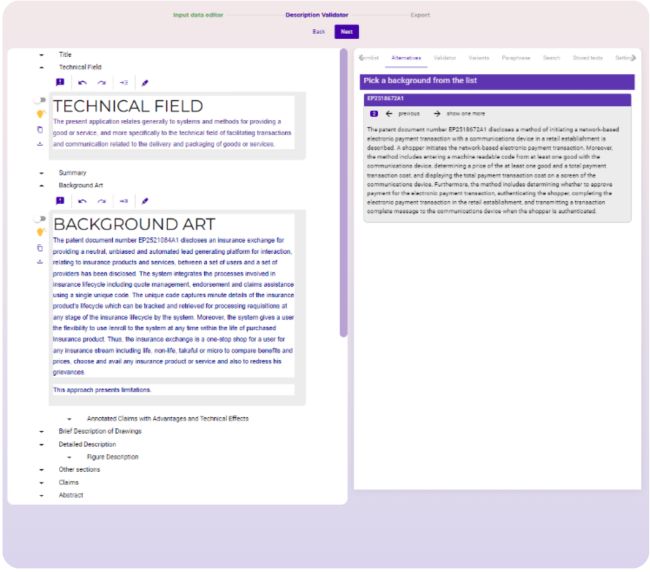
Whether you use a simple claim tree or upload the entire invention disclosure report, the tool will rapidly create a first draft, with users able to click on individual fields to view alternative text descriptions or drill down further into the background data. Further developments are in the pipeline to integrate the tool with Questel's vast patent database and associated software and services, including the ability to timestamp drafts on the blockchain.
- AI and IP Hot Topics: Patent Search
As the number of global patents filed, examined, litigated, and licensed globally inevitably continues to grow, it will become ever more challenging to find pertinent information in the enormous quantity of IP documents, data, and associated resources. This, in turn, will only increase legal risk.
Thanks to advancements in machine-learning algorithms, AI-elevated patent search tools such as Orbit Intelligence are already helping to resolve this challenge. Using a large language model, it provides AI-boosted summarization and classification tools to enable patent searchers to not only search patents more quickly and efficiently, but also communicate their findings to stakeholders more effectively. For example, by providing easy-to-follow reports with direct links to explanations of technical terms.
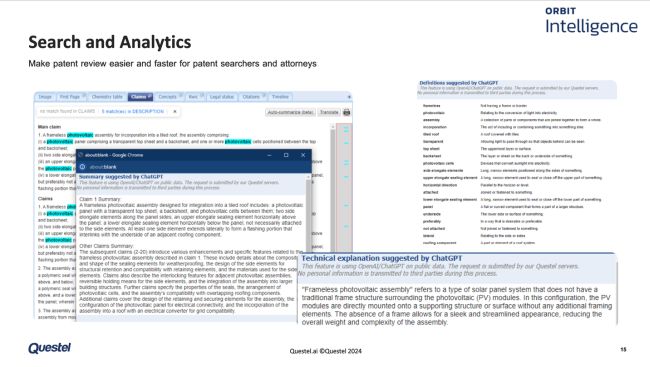
AI features in our patent search technology are evolving quickly, with new capabilities being added all the time. These include our AI-Classifier and Prosecution Pack tools, which enable users to customize patent classification and predict the likelihood of a successful patent grant.
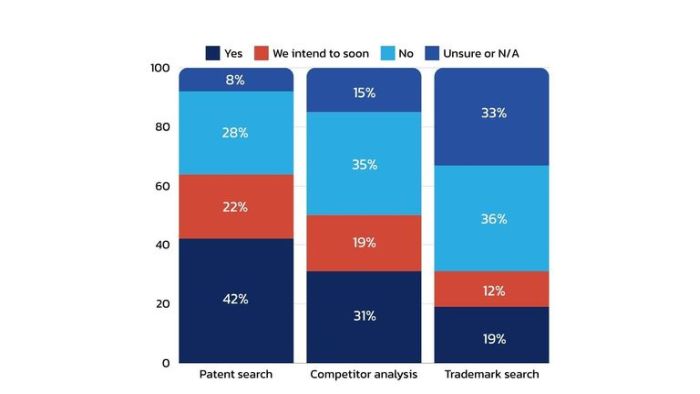
Did you know?
Nearly 65% of IP professionals already use AI tools for patent search or plan to do so soon.
Find out more about AI and IP and benchmark your approach to emerging technologies by downloading our Industry Outlook Research Report: ‘Beyond the Hype: How Technology is Transforming IP'.
- On the Horizon: AI and IP Portfolio Management
IP portfolio management represents the next frontier for AI, with double docketing, data entry errors, control over sensitive data, and lack of oversight just four of the common challenges that can be overcome by integrating AI features into IP management systems (IPMS).
Through automated reporting, data validation, and reminders, AI will be able to support paralegals, attorneys, and IP managers to take full control of their IP assets. Secure in the knowledge that the data held in their IPMS is accurate and complete, the volume of associated emails and paperwork will naturally decrease, while AI and IP copilots will provide instant access to data, deadlines, and workflows.
Next time you are asked to prepare for an IP committee, imagine simply having to ask your IPMS to generate the necessary data in your chosen template (click on the below image to open it in a wider screen).
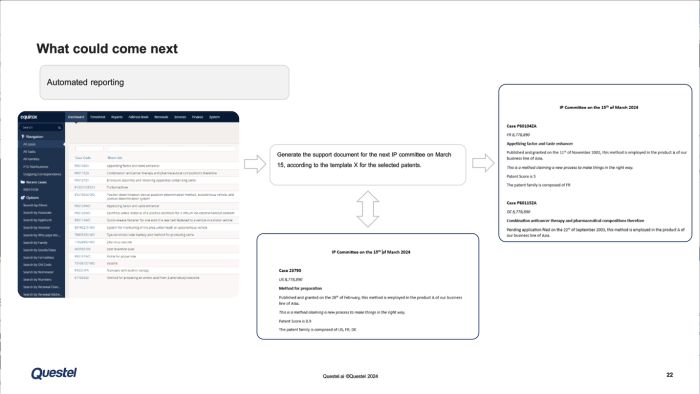
This ability to "ask" a system for an answer, as if interacting with a real person, is set to revolutionize how we interact with data and technology in the coming years. Not only will it improve our access to information, but we also expect it to inform how we design our AI and IP user interfaces in the years to come (click on the below image to open it in a wider screen).
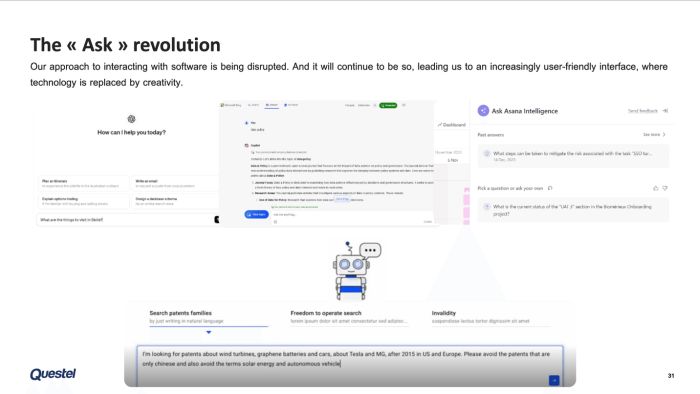
AI and IP: What About Security & Privacy?
Clearly, security and privacy are critical when it comes to implementing AI into our tools. Questel takes data security and safety incredibly seriously. We are ISO 27001 and GDPR compliant and encrypt all data at rest and in transit from our European-only data centers.
We do not use our clients' data to train our AI models, nor do we claim any ownership of the data generated through our AI and IP interfaces. With zero data training and zero data retention, clients can be assured they retain full control of their data and output.
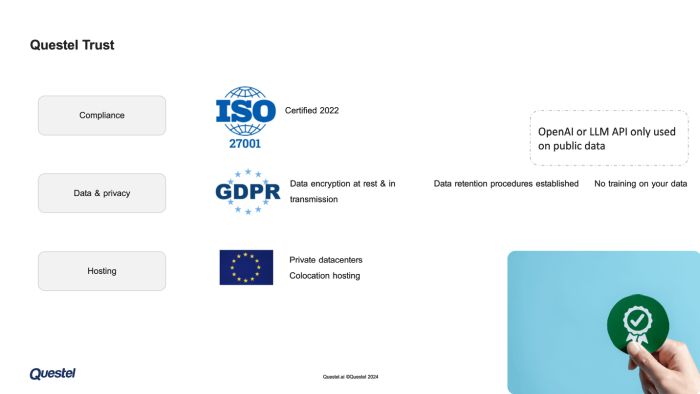
The content of this article is intended to provide a general guide to the subject matter. Specialist advice should be sought about your specific circumstances.
We operate a free-to-view policy, asking only that you register in order to read all of our content. Please login or register to view the rest of this article.

